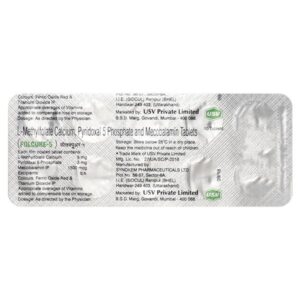CALCIUM + PYRIDOXINE (VITAMIN B6) + L-METHYLFOLATE
Calcium: Drug: Calcium
Use: Calcium is a mineral that plays a crucial role in the body, primarily in building and maintaining strong bones and teeth. It is also involved in other physiological processes such as muscle contractions, nerve function, blood clotting, and hormone secretion.
Mechanism of Action: Calcium functions as an essential component in the structure and function of bones. It is required for the synthesis and activation of various enzymes and proteins involved in cellular signaling pathways. In muscle cells, calcium ions are released from storage sites within the cell, leading to muscle contraction. Overall, calcium helps maintain the proper functioning of cells and tissues.
Dose: The recommended dietary intake of calcium varies depending on age, sex, and specific health conditions. Generally, adults require 1000-1200 mg of elemental calcium per day, while children and adolescents need lower amounts. Calcium supplements are available in various forms, such as calcium carbonate and calcium citrate, with different strengths. It is important to follow the dosage instructions provided by healthcare professionals or as stated on the product label.
Side Effects: When taken in appropriate doses, calcium supplements are generally considered safe. However, some individuals may experience side effects, including constipation, gas, bloating, and an upset stomach. Rarely, high doses of calcium supplements can lead to hypercalcemia, a condition characterized by an excessive level of calcium in the blood. Symptoms of hypercalcemia may include nausea, vomiting, increased thirst, frequent urination, fatigue, and confusion. People with certain medical conditions, such as kidney disease or hyperparathyroidism, should exercise caution when taking calcium supplements and consult with a healthcare professional. Calcium may also interact with certain medications, so it is important to inform healthcare providers about any other drugs being taken.
Pyridoxine (vitamin B6): Pyridoxine, also known as vitamin B6, is a water-soluble vitamin that plays a crucial role in various physiological processes in the body. It is commonly used as a dietary supplement to prevent or treat vitamin B6 deficiency.
The primary mechanism of action of pyridoxine is its conversion to its active form called pyridoxal 5′-phosphate (PLP). PLP acts as a coenzyme in numerous enzymatic reactions involved in the metabolism of amino acids, carbohydrates, and lipids. It is also involved in the synthesis of neurotransmitters such as serotonin, dopamine, and gamma-aminobutyric acid (GABA).
Pyridoxine is indicated for the treatment and prevention of vitamin B6 deficiency, which can occur due to various factors such as inadequate dietary intake, malabsorption disorders, liver disease, or certain medications that interfere with vitamin B6 metabolism. It may also be prescribed for certain medical conditions like neuropathy, premenstrual syndrome (PMS), and morning sickness during pregnancy.
The recommended daily dose of pyridoxine varies depending on the age, sex, and specific health conditions of the individual. For adults, the typical dose ranges from 1.3 to 2.0 mg per day. Higher doses may be prescribed for certain medical conditions, but this should be done under the supervision of a healthcare professional.
Although pyridoxine is generally considered safe, it can cause some side effects when taken in high doses for a prolonged period. These side effects may include nausea, vomiting, headache, numbness, tingling sensation (paresthesia), loss of coordination, and photosensitivity (increased sensitivity to sunlight). Long-term use of high doses of pyridoxine can also lead to peripheral neuropathy (nerve damage).
It is important to consult with a healthcare professional before starting pyridoxine supplementation, especially if you have any underlying medical conditions or are taking other medications, as there may be potential interactions or contraindications.
L-Methylfolate: L-Methylfolate, also known as Levomefolate Calcium or Deplin, is a prescription medication that is used as a dietary supplement to treat certain conditions related to folate deficiency. It is a biologically active form of folate, which is a naturally occurring B vitamin (Vitamin B9) essential for various bodily functions.
The primary use of L-Methylfolate is to manage major depressive disorder (MDD) as an adjunctive therapy. It is often prescribed alongside antidepressant medications to enhance their effectiveness. L-Methylfolate can be especially beneficial for individuals who have a genetic mutation (known as MTHFR polymorphism) that impairs the body’s ability to convert folic acid to its active form and utilize it properly.
The mechanism of action of L-Methylfolate involves its role in the synthesis of neurotransmitters such as serotonin, dopamine, and norepinephrine. By increasing the availability of these neurotransmitters in the brain, L-Methylfolate may help improve mood and reduce symptoms of depression.
The recommended dose of L-Methylfolate may vary depending on the individual’s specific needs and the condition being treated. Generally, the starting dose for adjunctive treatment of MDD is 7.5 mg daily. However, the dose can be adjusted by a healthcare professional based on the patient’s response and tolerance.
As for side effects, L-Methylfolate is usually well-tolerated. However, some individuals may experience mild gastrointestinal symptoms such as nausea, vomiting, or diarrhea. In rare cases, allergic reactions or hypersensitivity may occur, leading to rash, itching, or swelling.
It is important to note that L-Methylfolate should only be taken under the supervision and guidance of a healthcare professional. They will determine the appropriate dose and monitor the patient’s response to treatment. L-Methylfolate should not be used as a substitute for standard antidepressant therapy but rather as an adjunct therapy to enhance its effects.

